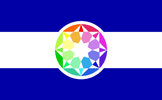1. Meeting at the Embassy
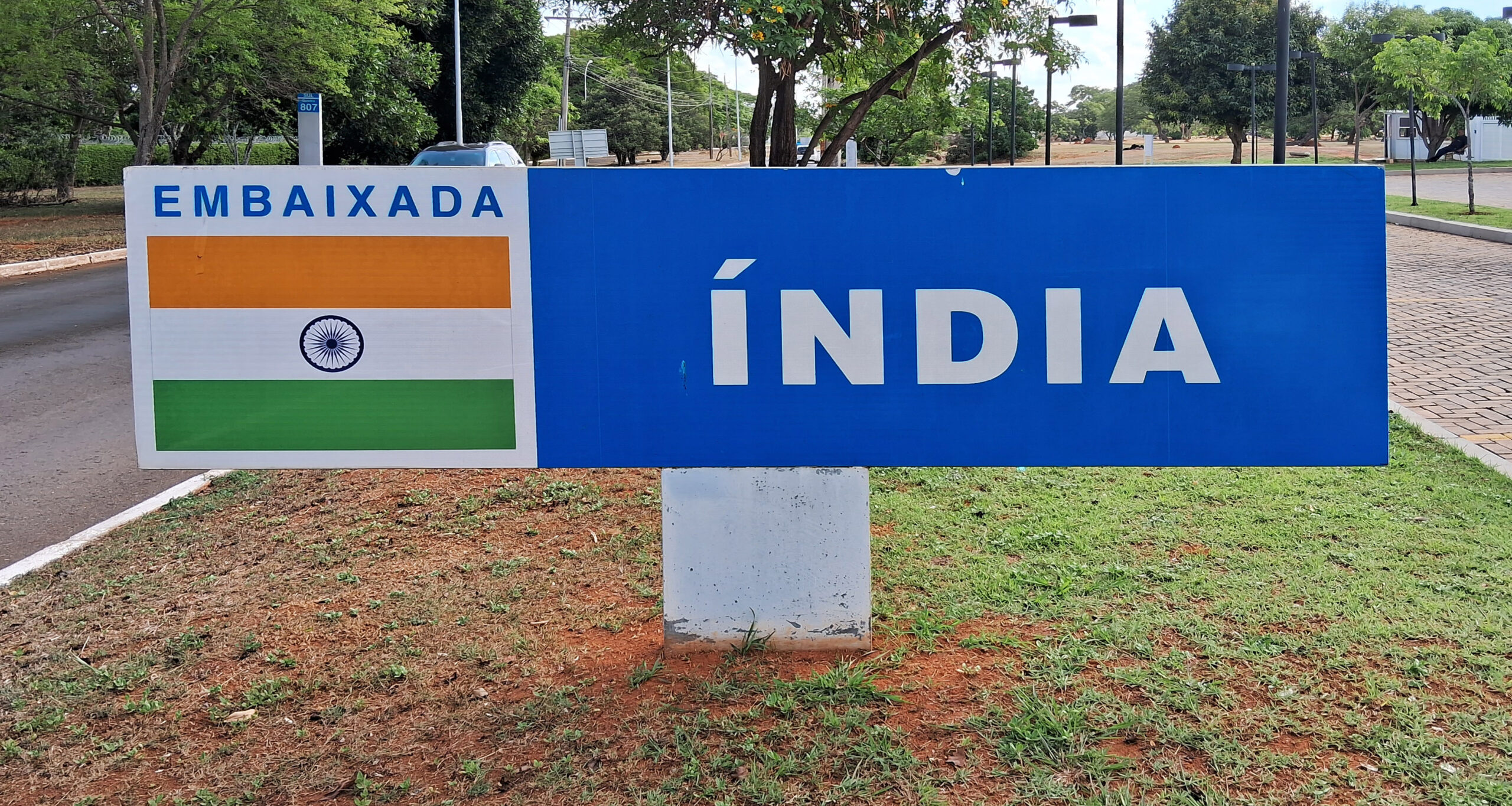
Indian Embassy road sign, in the embassy area of Brasilia
The 23/10/2023 has 16 hours, we had the chance and the honor to meet S.E. The assistant ambassador of India in Brasilia, M. B.C. Pradhan, pendant a meeting that lasted 1 hour and 45 minutes, to l’ India embassy in Brasilia.
He had rightly accepted our meeting proposal, and he even did it quickly (less than 12 hours after we sent it to him).
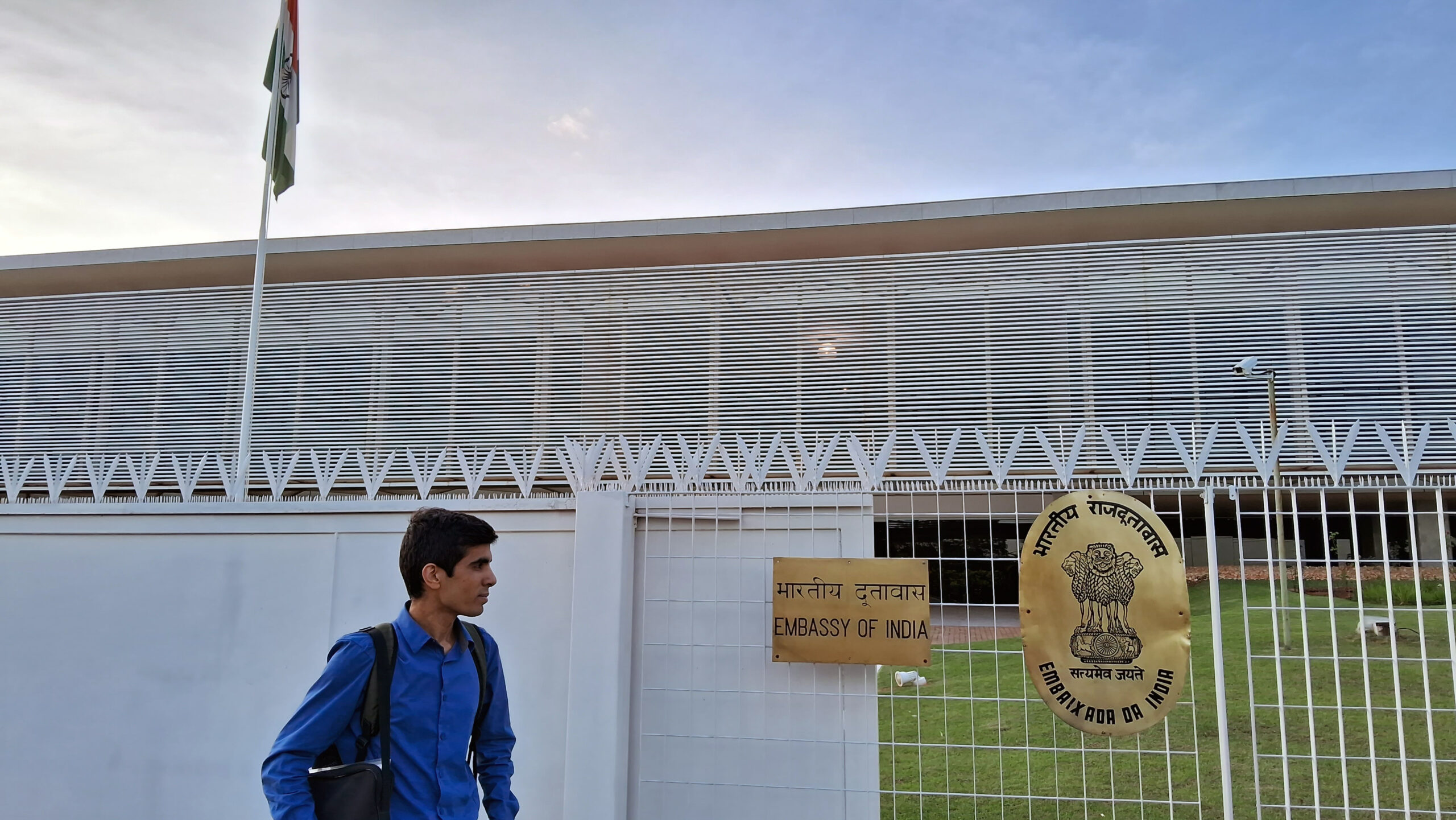
Entrance to the Indian Embassy in Brasilia
At first, the meeting was a little difficult for us because it was a little intimidating, but with a verbal and on-site dialogue, we can still manage to ‘break the ice’ and create a real connection.
SO, gradually, the discussion became more specific, friendlier and more helpful.
India is a very important country, not only because it is about to become the most populous in the world, but also because India has a culture of firm but non-violent resistance (Mahatma Gandhi, Jawaharlal Nehru…), and tolerance and openness, of which this meeting was an example.
This country is also dear to the hearts of those who had the chance to discover their “mild” autism thanks to the Indian film “ My name is Khan« .
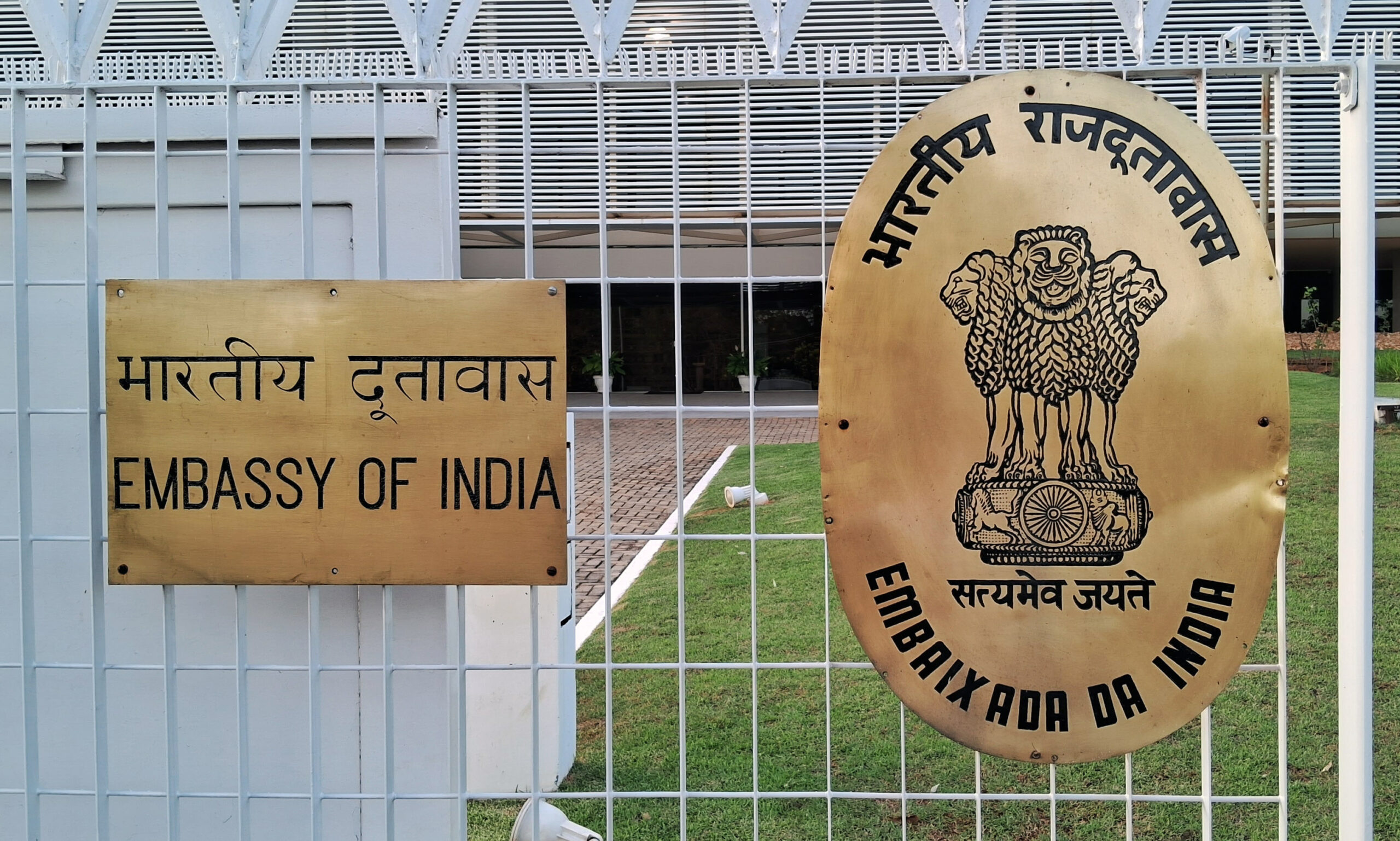
Plaques from the Indian Embassy in Brasilia
Among others, M. B.C. Pradhan offered to facilitate communication with relevant authorities in India, which was the main objective of our initiative.
Indeed, when we contact the authorities of various countries from Brazil, and as an autistic people’s organization, it seems that in general they really don't pay attention to it, probably because it must seem like something “other-worldly” to them..
This is why we must be able to speak orally and face to face, and this is exactly what embassies are made for.
At the end of the meeting, we very much appreciated the efforts of the deputy ambassador to improve the photo taking, changing location several times and repeating shots at least 19 times, something we wouldn't have dared to ask, but which perfectly matched our wishes.
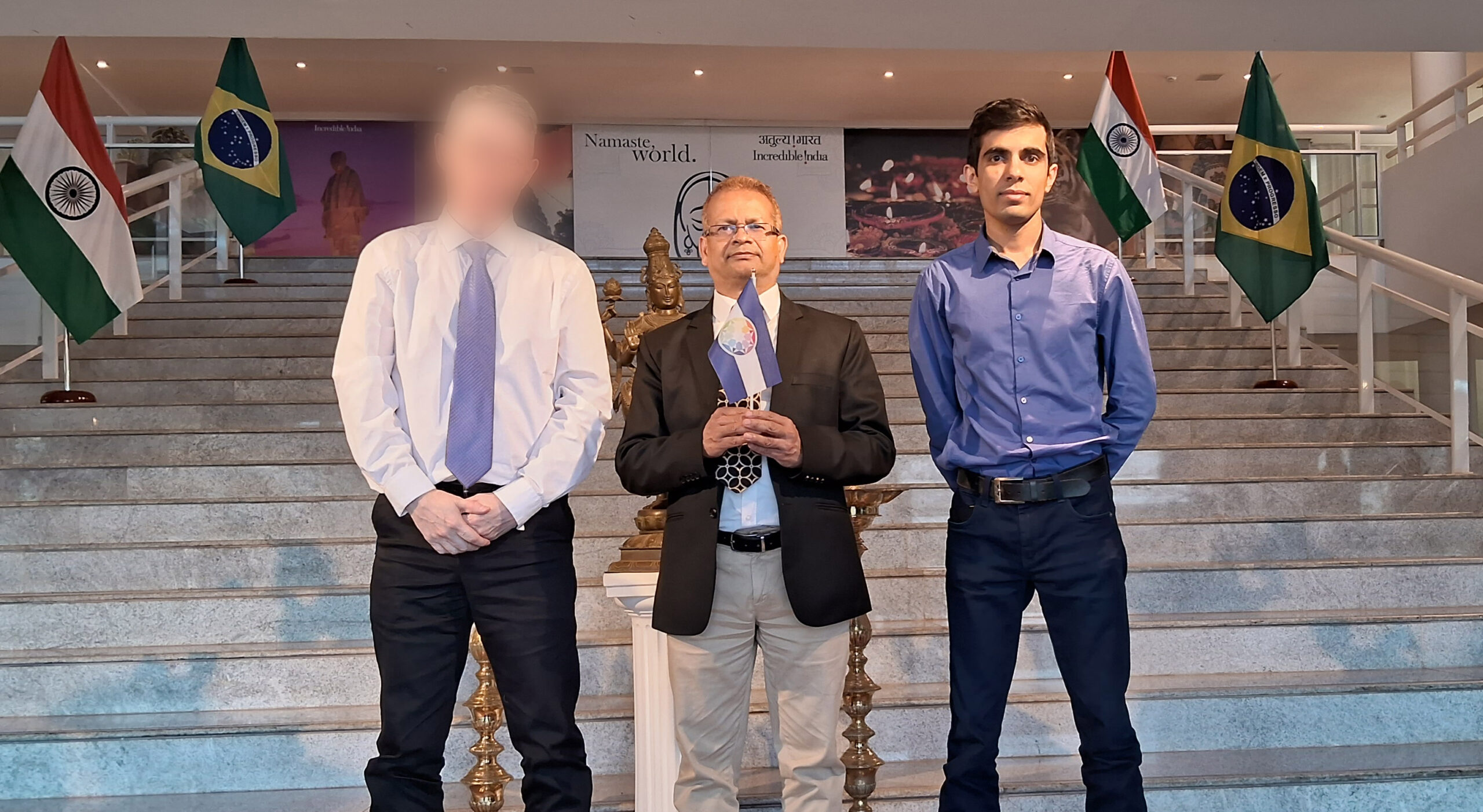
His Excellency the Deputy Ambassador of India in Brasilia, holding the Autistan flag at the Indian embassy. (On the left, the founder of the Autistan Diplomatic Organization (who does not wish to be publicly exposed), and to the right, son assistant.)
This is just a first contact, but it is very encouraging.
This shows that serious people take us seriously, by making the effort to talk to us, which allows them to check if what we say is realistic or not.
We have written a brief report on the meeting, and m. B.C.. Pradhan wrote to us to tell us that he found it “truly fascinating”.
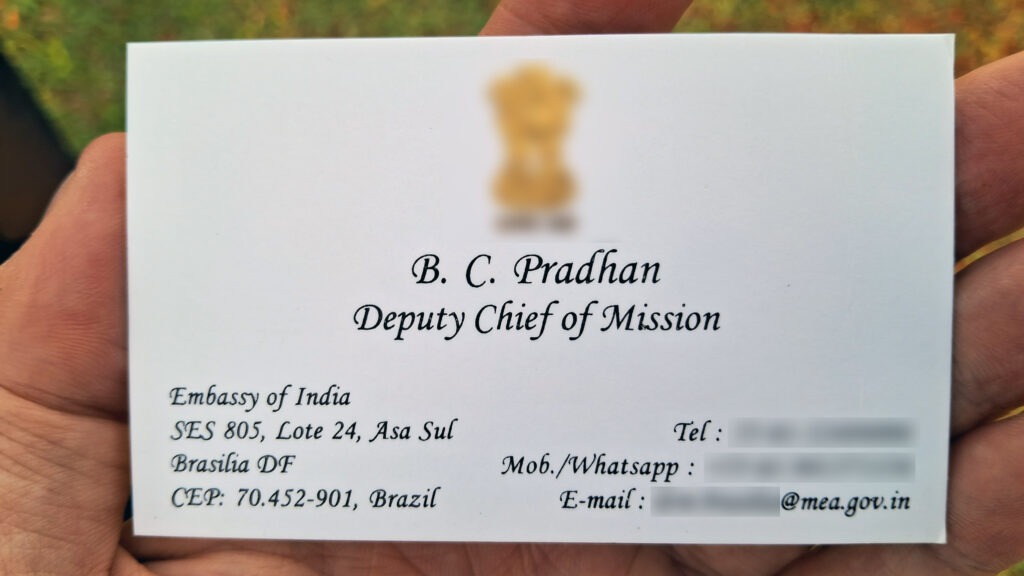
Business card of H.E.. the deputy ambassador. (The emblem of India is blurred here, to avoid facilitating the projects of possible counterfeiters).
Note: Before this meeting, we printed, we read and annotated the various official texts (laws and others) on disability and autism in India.
There is a lot to say about this, and we'll come back to that later, once we establish a connection with the authorities in the Indian capital.
Waiting, we will publish links to these texts in the section “ Autism in India » (currently under construction).
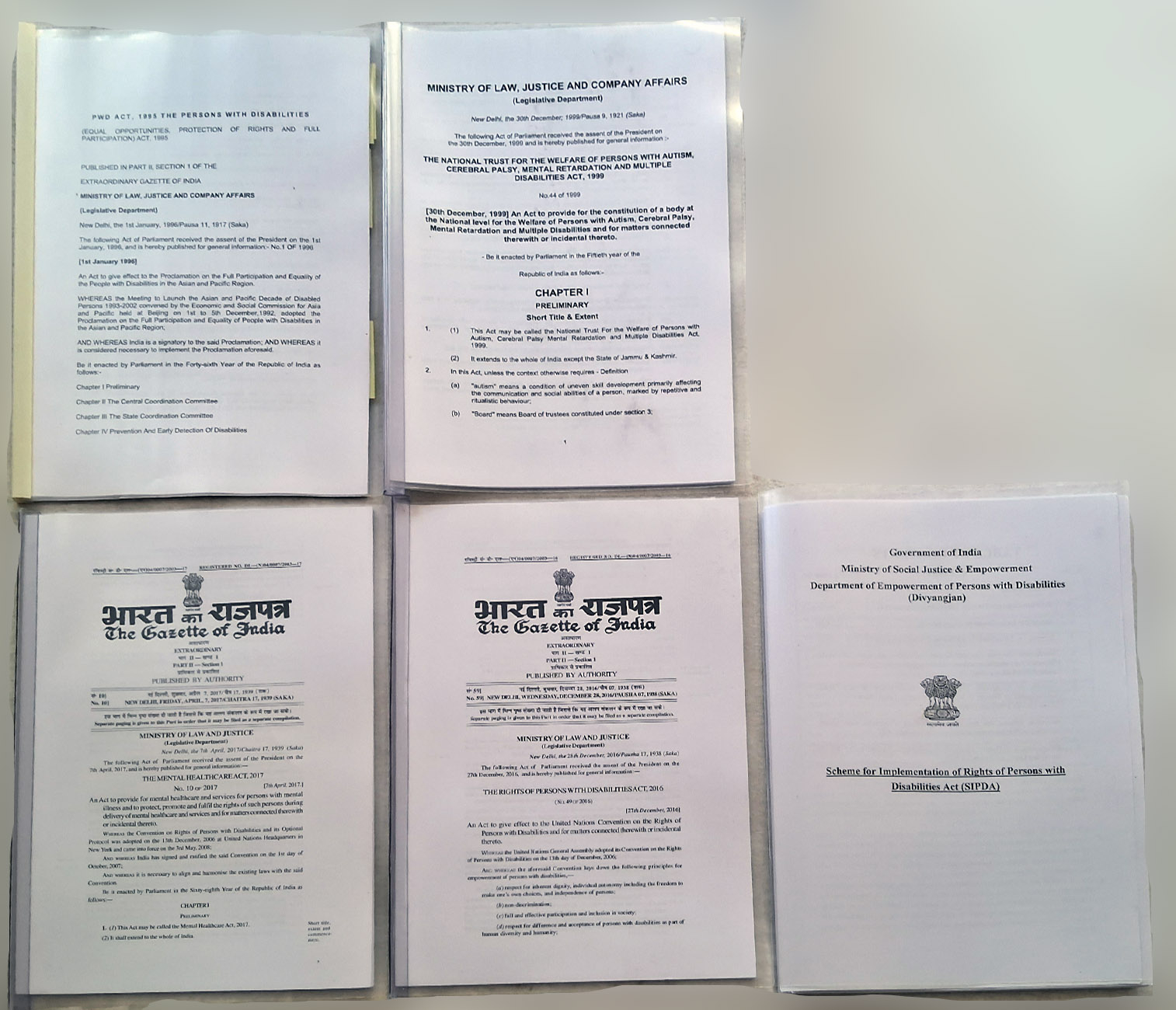
2. Our brief report on the meeting
Here is our text:
The 23/10/2023, we had the honor and the chance to be received by Mr.. B.C. Pradhan, Vice Ambassador of India to Brazil.
He was very kind, considerate, available, patient, open and attentive.
The main points of the meeting:
A- From our Organization
A1- First of all, it is essential to understand the difference between “autism” and “disorders or disorders characterizing autism”, without which it is difficult, or even impossible, to talk about autism without getting lost in confusion and absurd paradoxes, which unfortunately happens almost all the time.
A2- The crucial importance of the notion of accessibility for autistic people, unfortunately misunderstood or ignored.
A3- The notion of what we call “socio-generated harm (or disturbances) socio-generated) » (sensory, mental or other).
A4- The fact that autism can be compared, in our vision, to a sort of self-protection of natural harmony, and the central importance of the notion of harmony and coherence in understanding autism and in reducing these impairments and therefore suffering.
A5- La citation du philosophe indien Jiddu Krishnamurti, which could almost summarize our approach: « It is not a sign of [Good] health (mental) to be [GOOD] adapted to a deeply ill society« .
A6- The qualities of autism (and some examples of achievements in our Embassy).
A7- The measures to be taken to ensure accessibility for autistic people are not extravagant, and do not harm non-autistic people: on the contrary, they are beneficial to them, starting with the most vulnerable, like old people.
It's just a matter of correcting the errors., the excesses and absurdities of the “normal system”, that harm everyone.
A8- When we simply “silence” autistic people (For example, in case of crisis, which are inevitable given the lack of accessibility and therefore the omnipresence of “violations (or disturbances) socio-generated) »), without trying to understand the underlying causes, it's like turning off the lights or sirens of an alarm system without investigating the underlying source.
Indeed, We (Autistics) we are very, very sensitive to problems, to errors and absurdities, etc., so we are like “revealers” or early warning systems useful to society to correct itself, and unfortunately we see each day a little more how necessary this is (destruction and evil gets worse, created by a “lost system”).
A9- It is essential not to approach “autism” with a “defectological approach”, but without denying the existence of “troubles” (cf. fundamental distinction to be made between the two, see A1).
Examples with anecdotes from Kazakhstan, especially the dazzling success with young Tima (video evidence on Autistan.kz).
A10- If we only had to remember one word about autism, it would be “try” or “experiment” (as many different and new things as possible).
And this is precisely what M. Pradhan did with us, which is very appreciated, given that autism and our project do not really fall within the remit of its Embassy.
On the other hand, we must understand that in any case there is nothing planned for autistic people (apart from defective and “formatting” things) in a society “planned by itself for itself”, there is no space, no possibility, so we have to try different things, more or less randomly, we have to knock on all kinds of doors, to try to advance the positive approach to autism, what is absolutely necessary.
A11- It is possible for our Organization to provide truly useful information, even without necessarily being administratively registered in this or that country (with supporting examples, such as the letter from Mr.. Shekhar Saxena, the director of mental health of the WHO at the time – who is also an Indian, Besides).
A12- The main objective of our Organization is to dialogue with the public authorities of countries, offer them information to help them better understand autism, and thus reduce misunderstandings and confusion, which in turn contributes to improving public policies.
A13- We can also help reduce conflicts with local or national associations.
A14- Through face-to-face exchanges here in Brasilia, embassies can help establish links with public authorities in their country concerned with autism.
Indeed, when we contact them ourselves from afar, they very rarely respond because it is probably too abstract / distant / unusual for them (in other words, the “human connection” is missing).
A15- For a country as big as India, the relevance of the idea of a special service to exploit the analyzes of very gifted people (including some autistic people) to solve really serious and delicate problems. With 1 billion inhabitants, it must be possible to find enough “super-brains”.
B- The main points of the Deputy Ambassador
B1- He advises us to contact ALGEBRIC, a think tank on international relations, in the perspective of the G20, whose presidency will be ensured by Brazil, and starting soon.
CEBRI is actually based in Rio de Janeiro.
This seems like very useful advice, and we will do our best to approach this organization and try to convince them of the relevance of our information and, si possible, of our participation.
This is a good example of the usefulness of talking to embassies, because without that, we wouldn't have had this idea.
(Changing 10/12/2023 : CEBRI seems rather oriented towards the economy, and we looked at all their publications, but they only contained the word ‘social’ once, and only in the title.
On the other hand, these tips allowed us to know Concept C20, which is not about ‘Think Tanks’ (T20) but about civil society, including the issue of minorities and disability.
So we're trying to get responses from various people and organizations to try to participate.)
B2- He offers to facilitate contacts with relevant public institutions in India if we visit the country, which seems impossible at the moment due to lack of resources, but we suppose that this arrangement can also be useful when attempting to communicate remotely.
B3- In discussions relating to natural things, spiritual and soothing, we mentioned the “Mantra Gayatri” , and he spoke about various things including “Iskand”(?) (to study).
B4- After listening with interest to Eric L’s explanations. about Indian film « My name is Khan » (that he knows, which helps a lot), about the tremendous revelation (autism) made possible by this film, and on attempts to leave a note for the actor Sha Rukh Khan during a visit to Mumbai, M. Pradhan very kindly offered to intervene so that we could meet him during a visit to India. This very interesting proposition could probably be used for a letter (with an answer). A explorer.
B5- Finally, given our difficulties in obtaining an appointment with the National Secretariat for the Rights of Persons with Disabilities of Brazil, and given the date of our first letter to them (22 days earlier), he suggests sending them a respectful reminder.
We took the opportunity to mention the problems of incommunicability with easily offended administrations., especially in France, which leads to important considerations on the notion of humility and “putting egos second”, qualities very present in Brazil, but also in India, clearly.
(Speaking of humility, M Pradhan even went so far as to thank us in writing “for using our precious time” for him, when in fact it was quite the opposite!
A great lesson in diplomacy, which must be remembered).
B6- He concluded by saying how much he enjoyed the discussion., and for learning new things.
C- Conclusion
M. B.C. Pradhan listened attentively et he took all the time he needed (two things which are really essential to be accessible to autistic people).
3. Message from the Deputy Ambassador, who found our brief report “truly fascinating”
Date: mer. 25 october. 2023 has 19:22
Subject: Concerning: Summary report of our meeting 23/10/2023
HAS: <contact@autistan.org>
Cc: Suresh K.. Reddy <***@mea.gov.in>
Deputy Head of Mission
Embassy of India, Brasilia
SSE 805, Lot 24, South wing
Brasilia DF
CEP: 70.452-901, BRAZIL
Such: +55 61 98157****

